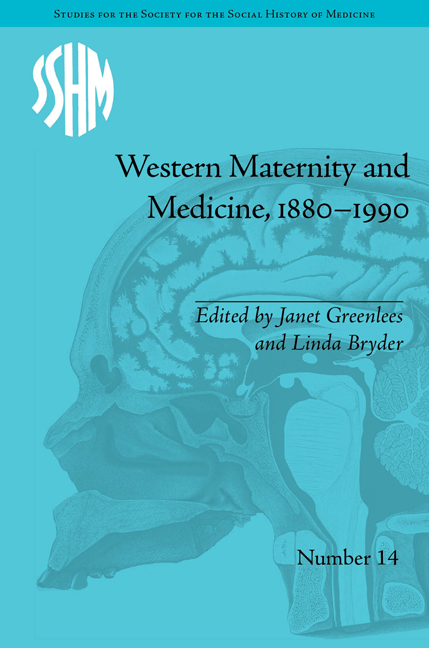Book contents
- Frontmatter
- CONTENTS
- Acknowledgements
- List of Contributors
- List of Tables
- Western Maternity and Medicine: An Introduction
- 1 Safely Delivered? Insights into Late Nineteenth-Century Australian Maternity Care from Coronial Investigations into Maternal Deaths
- 2 Pregnancy, Pathology and Public Morals: Making Antenatal Care in Edinburgh around 1900
- 3 ‘The Peculiar and Complex Female Problem’: The Church of Scotland and Health Care for Unwed Mothers, 1900–1948
- 4 Taking ‘Advantage of the Facilities and Comforts … Offered’: Women's Choice of Hospital Delivery in Interwar Edinburgh
- 5 ‘What Women Want’: Childbirth Services and Women's Activism in New Zealand, 1900–1960
- 6 'Twixt God and Geography: The Development of Maternity Services in Twentieth-Century Ireland
- 7 Test Tubes and Turpitude: Medical Responses to the Infertile Patient in Mid-Twentieth-Century Scotland
- 8 Women's Experiences of the Maternity Services in Berkshire and Oxfordshire, c. 1970–1990
- 9 From Muller to Johnson Controls: Mothers and Workplace Health in the US, from Protective Labour Legislation to Fetal Protection Policies
- Notes
- Index
2 - Pregnancy, Pathology and Public Morals: Making Antenatal Care in Edinburgh around 1900
- Frontmatter
- CONTENTS
- Acknowledgements
- List of Contributors
- List of Tables
- Western Maternity and Medicine: An Introduction
- 1 Safely Delivered? Insights into Late Nineteenth-Century Australian Maternity Care from Coronial Investigations into Maternal Deaths
- 2 Pregnancy, Pathology and Public Morals: Making Antenatal Care in Edinburgh around 1900
- 3 ‘The Peculiar and Complex Female Problem’: The Church of Scotland and Health Care for Unwed Mothers, 1900–1948
- 4 Taking ‘Advantage of the Facilities and Comforts … Offered’: Women's Choice of Hospital Delivery in Interwar Edinburgh
- 5 ‘What Women Want’: Childbirth Services and Women's Activism in New Zealand, 1900–1960
- 6 'Twixt God and Geography: The Development of Maternity Services in Twentieth-Century Ireland
- 7 Test Tubes and Turpitude: Medical Responses to the Infertile Patient in Mid-Twentieth-Century Scotland
- 8 Women's Experiences of the Maternity Services in Berkshire and Oxfordshire, c. 1970–1990
- 9 From Muller to Johnson Controls: Mothers and Workplace Health in the US, from Protective Labour Legislation to Fetal Protection Policies
- Notes
- Index
Summary
In the decade or so before the outbreak of World War II, welfare reformers in Britain declared the systematic provision of care to mothers and young children by the state ‘one of the most successful developments of public health work’: infant mortality had more than halved between 1900 and 1925. Leaders of the maternal and child welfare movement credited this new ‘hope for baby’ to the realization around 1900 that infant mortality was preventable and were optimistic that the medical supervision of pregnancy would further reduce the ‘still disgraceful death-toll’ of mothers and neonates. What came to be described as ‘antenatal care’ around the time of World War I was one of several new health and welfare programmes – the regulation of midwives, the expansion of health visiting, infant feeding centres and baby clinics – usually taken to mark the origins of a welfare state which prioritized mothers and infants. Much historical writing has analysed the contested ‘politics of motherhood’ these initiatives responded to and continued to shape.
While we have many general accounts of the introduction of antenatal care as part of a package of state-sponsored maternal and infant welfare reforms in Britain and elsewhere, we know less about its early history, especially at a local level prior to legislation. Those reformers arguing for the expansion of medical supervision of ‘expectant mothers’ draw on the perceived success of initiatives in several countries, but most histories recognize Edinburgh as pioneering.
- Type
- Chapter
- Information
- Western Maternity and Medicine, 1880–1990 , pp. 31 - 46Publisher: Pickering & ChattoFirst published in: 2014



